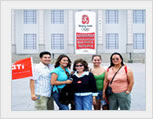
China Public Holidays
 New Year's Day (1 Jan, 1 day holiday)
New Year's Day (1 Jan, 1 day holiday)
In 46 B.C. the Roman emperor Julius Caesar first established January 1 as New Year's Day. Caesar felt that the month named after the god of beginnings, hearths and gateways ("Janus") would be the appropriate "door" to the year.
Spring Festival (Normally in Jan or Feb, 7 day's holiday)
Spring Festival is often called "New Year" due to the lunar calendar used in Chinese history. According to this, it is the first day of the first lunar month, and marks the beginning of a year. This is often associated with the twelve animals of the Zodiac, with different animals being associated with the year in twelve yearly cycles.
 Labour Day (1 May, 3 days holiday)
Labour Day (1 May, 3 days holiday)
A tradition has been costumed for many years. Labour Day marks a special celebration for the workers in China, offering them a holiday as a testament to their cause. This echo's the American Labour day holiday which was legislated by Congress 100 years ago.
National Day (1 Oct, 7 days holiday)
The People's Republic of China's National Day was originated on October 1st, 1949. Taking place in the afternoon in the middle of Tian'anmen Square, one of the largest open spaces in Beijing, the holiday marks the first time the five star flag was raised. The ceremony took place in front of 300,000 people as Chairman Mao declared the founding of the PRC.
Your Question & Quick Answer*We welcome and appreciate your questions & reviews
Booking Procedures | Terms & Conditions | Payment Methods | Links | Site Map | About Us | Contact Us | Travel Agent
Copyright 2008, All rights reserved.. itourbeijing.com ,china culture, china introduction
TEL: 86-10-85711972 (Universal) 1-888-288-9328 (North America) E-mail: contact@itourbeijng.com
Home | China Tours | Beijing Tours | Tibet Tours | China Travel | Beijing Travel | Shanghai Travel



